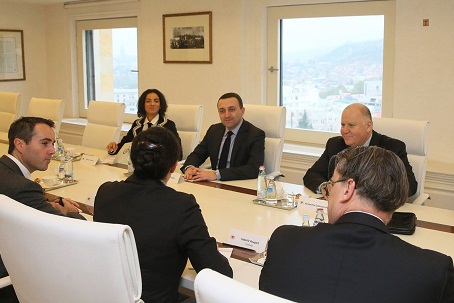OSCE envoys hold first meetings in Georgia since 2008

Permanent representatives of the Organisation for Security and Co-operation in Europe (OSCE) are holding their first meetings in Georgia since July 2008 – one month before the deadly Russia-Georgia clash.
American, Canadian, Lithuanian, Romanian and Swedish envoys to the OSCE, the world's largest security-oriented intergovernmental organisation, have today met with Georgia’s Prime Minister Irakli Garibashvili and Georgia’s Special Envoy to Russia Zurab Abashidze.
Georgia’s state security, conflicts, Russian aggression and creeping occupation, human rights, the justice system and other domestic and foreign affairs were discussed at the meetings.
Garibashvili told the OSCE guests their visit was the best way for them to familiarise themselves with the real situation in the country.
Garibashvili spoke about the successful reforms in Georgia that aimed to empower the country as it strived towards Europe, and Georgia’s peaceful attitude to solving conflicts, a statement on the Prime Minister’s webpage read.

OSCE representatives meet Georgia’s Special Envoy to Russia Zurab Abashidze. Photo by Government’s webpage.
Georgia’s Special Envoy to Russia Zurab Abashidze stressed the OSCE representatives were "very much interested” in the current Russia-Georgia relations.
They were well-informed as well,” Abashidze added.
We spoke about the difficulties and problems that existed in the Russian-Georgian relations. We also discussed the situation in terms of Georgia’s direct dialogue with Russia,” Abashidze said, noting the OSCE representatives asked whether he had discussed the same issues with Russia’s Special Envoy that were mentioned at the Geneva International Talks.
While in Georgia the OSCE Permanent Representatives were scheduled to visit Khurvaleti village where Russian border guards have illegally erected barbed wire fences, before visiting the internally displaced people’s (IDP) settlement in Tserovani.
The foreign guests will end their three-day visit to Georgia on November 4.
The OSCE mission was established in Georgia in 1992 and they supported the local Government to cope with conflicts, address human rights and rule of law. However it was impossible to reach a consensus over continuing of the mandate and the mission closed in 2008.
The OSCE focussed on early warning, conflict prevention, crisis management and post-conflict rehabilitation. Its 57 participating states are located in Europe, northern and central Asia and North America, and cover much of the land area of the Northern Hemisphere. The OSCE was created during the Cold War era as an East–West forum, in 1975.
 Tweet
Tweet  Share
Share